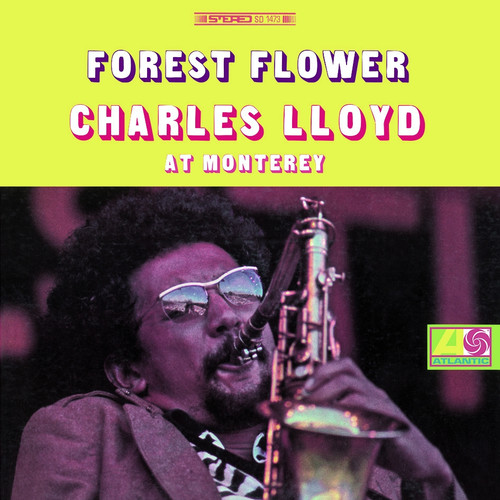Charles Lloyd's sixth ECM album is both a departure and a homecoming for the Memphis-born and California-based tenorist, introducing new music and revisiting archive favourites (including the epic 'Forest Flower'), and featuring an all-star line-up. With his 'Scandinavian' band currently on hold,this is Lloyd's first all-American album in a long while - Dave Holland qualifies as an honorary American by now - with all the differences of cultural emphasis that this implies. ECM veteran John Abercrombie and legendary drummer Billy Higgins are in great form throughout as they lock in with Lloyd to tackle material ranging from Billy Strayhorn's 'A Flower Is A Lovesome Thing' to the Elvis Costello/Burt Bacharach-penned 'God Give Me Strength' or dig deep into the roots music of the 'Island Blues Suite'.
Initially published on CD in February 1999, vinyl is issued in June 2019.
FEATURED ARTISTS
TRACKLIST
A1 Voice In The Night, Composed By – Charles Lloyd 6:31
A2 God Give Me Strength, Composed By – Burt Bacharach, Elvis Costello 4:41
A3 Dorotea's Studio, Composed By – Charles Lloyd 7:48
B1 Requiem, Composed By – Charles Lloyd 6:00
B2a Pocket Full Of Blues, Composed By – Charles Lloyd (11:41)
B2b Island Blues
B2c Little Sister's Dance
B2d Shade Tree
B2e Mud Island
C Homage, Composed By – Charles Lloyd 9:25
D1 Forest Flower: Sunrise / Sunset, Composed By – Charles Lloyd 15:23
D2 A Flower Is A Lovesome Thing, Composed By – Billy Strayhorn 6:46
BACKGROUND
Charles Lloyd's sixth ECM album is both a departure and a homecoming for the Memphis-born and California-based tenorist, introducing new music and revisiting archive favourites, reaffirming old friendships and forging new alliances. If it can be characterized, crudely, as an "all-star" project, it also reveals a spirited and mutually beneficial balancing of talents.
Until now, all of Lloyd's post-"comeback" albums have had a strong Scandinavian component - legitimate enough since the impact of Charles's 1960s quartet was felt particularly strongly in the far North, and the understanding between the saxophonist and his Swedish pianist, Bobo Stenson, has been the focus of much of the music since 1989's "Fish Out Of Water". Time was ripe for a fresh perspective, however, hence "Voice in the Night", which can be considered Lloyd's first American album in a long while. Bassist Dave Holland may be nominally an Englishman still, with roots in Wolverhampton, but is the first to admit that "an Americanization has indeed taken place" in the three decades since he crossed the Atlantic to join Miles Davis. So: it is for all intents and purposes an American band Lloyd has rallied here, recorded in New York - a further departure - with all the differences of cultural emphasis that this implies.
For Lloyd, the starting point for this disc was his long-standing association with Billy Higgins. Higgins and Lloyd first worked together as long ago as the mid 1950s, when the saxophonist was studying for his master's degree in music at the University of Southern California. They played together with other friends including Ornette Coleman, Don Cherry, Scott LaFaro and Eric Dolphy on the Los Angeles jazz club circuit. Higgins, of course, followed Ornette and Cherry eastward as one quarter of Coleman's history-changing group. Lloyd and Higgins have remained friends over the years, and in 1994 renewed their playing association as part of the collective called Acoustic Masters (with pianist Cedar Walton and bassist Buster Williams). Lloyd's last album, "Canto", was dedicated to Higgins, in celebration of the drummer's resilient recovery from major surgery.
Last heard on ECM in 1983 with Pat Metheny and Charlie Haden on "Rejoicing", Billy Higgins has one of the most comprehensive resumés in modern jazz, having played with John Coltrane, Thelonious Monk, Sonny Rollins, Cecil Taylor, Art Pepper, Lee Morgan, Zoot Sims, Dexter Gordon, Jackie McLean, Wayne Shorter, Joe Henderson, David Murray, Hank Jones, Randy Weston and dozens more. Brian Priestly: "The apparent flexibility required to work for the many leading stylists who have employed Higgins is very real; but, more than that, it is a reflection of the responsiveness present in his playing at any given moment. The dancing pulse of his cymbals is sufficiently mesmeric to make any group of which he is a member function at its optimum level."
In the early 1960s, when Lloyd was still musical director of Chico Hamilton's group, he brought the exciting Hungarian guitarist Gabor Szabo into the band and featured him also on "Of Course, Of Course", one of the first albums issued under Charles's name. Lloyd and Szabo had a particularly close rapport, and were able to spur each other to new soloistic heights. One young guitar player who monitored those early discs was John Abercrombie, who appreciated the manner in which Szabo moved outside conventional jazz terms of reference. "Gabor had this interesting cross-breeding of sounds, "Abercrombie told "Down Beat". "I heard him and thought to myself, 'Go ahead, you don't have to play like Barney Kessell. Music changes. You're free.'"
John Abercrombie, in pre-ECM days, also briefly occupied the guitar chair in Hamilton's quintet and has gone on to stretch the possibilities of jazz guitar in his own, thoughtful way. On different occasions, in different interviews, he's described himself as "basically a free form Ornette Coleman style player" and a modern jazz traditionalist in the tradition of Charlie Christian, Tal Farlow and Jim Hall ("when I first heard Jim Hall - with Sonny Rollins - it was like a great door was flung open"). Saxophone players were an influence from the beginning: Charlie Parker, Coltrane with Miles Davis, Wayne Shorter - and Charles Lloyd. "I'd always been fascinated by saxophonists who could play long phrases with a single breath. Charles Lloyd and Coltrane used to flip me out because they could play these long legato sweeps..."
The edginess in Abercrombie's playing on "Voice In The Night" has already prompted some listeners to make comparisons with "Timeless", his ECM debut. Lloyd plainly enjoys his company, and gives him plenty of solo space - as on the long guitar intro to the irresistibly hook-laden "Dorotea's Studio" - and with piano absent from the music, the saxophonist is also freer in his phrasing and pitch decisions. Abercrombie is currently enjoying a busy and creative period. At the time of writing he is on tour with Kenny Wheeler's "Angel Song" quartet, having replaced Bill Frisell in that august ensemble. Already recorded and scheduled for release on ECM in '99 is "Open Land", an album featuring the Abercrombie "organ trio" with Dan Wall and Adam Nussbaum plus guests Kenny Wheeler, Joe Lovano and Mark Feldman...
Dave Holland has occasionally played with Charles Lloyd in festival contexts (and of course has a continuing musical relationship with John Abercrombie in the Gateway trio). He's also been a key contributor to two of the most successful ECM recordings of recent history - the aforementioned "Angel Song" and "Thimar" by the transcultural jazz and Arab music trio that includes Anouar Brahem and John Surman. Both of those records, driven by Dave's flawless sense of time, were liberally showered with prizes and awards, as was Holland's own Grammy-nominated "Points of View" with his quintet. A new Holland disc is also in preparation.
Choice of material on "Voice In The Night" is far-reaching. The title track immediately impresses as one of Lloyd's most magisterial compositions, the yearning quality of the saxophone to the fore. As journalist Josef Woodard puts it, "A ballad is one of Lloyd's favourite places to haunt, giving free expression to the innate introspection of breathy long tones, fleet arpeggiated figures, and vocal-like phrasing. He inhabits the slow-brewing and spacious world of 'Requiem' and 'Voice in the Night' naturally and eloquently. This is not a languid two-drinks-past-midnight voice, but one of restful alertness, yielding to impromptu flurries of energy." There is also the "up-tempo musical cross-talk" of "Homage": "As a young man Lloyd carved his own path and established a unique and original voice. He calls himself a 'junior elder' now. Even so, he is never shy about acknowledging the wellspring of his roots. On 'Homage' we can detect facets of tribute to Lloyd's predecessors and mentors - Robert Johnson, Charlie Parker, Billie Holiday, Coleman Hawkins, John Coltrane, Lester Young...the list goes on."
Lloyd also acknowledges his own past here with the deployment of two vintage compositions. "Island Blues" was a staple of his mid-60s quartet which introduced the talents of Keith Jarrett and Jack DeJohnette to the world at large. The quartet on "Voice In The Night" also tackles the most celebrated Lloyd tune of all, "Forest Flower." Originally the title track of the Atlantic album that documented his performance at the 1966 Monterey Jazz Festival, "Forest Flower" became one of the first ever jazz discs to sell a million copies. It received unprecedented airplay on the burgeoning FM radio stations of the day and put the quartet, to its members' surprise, onto the rock circuit: they played San Francisco's Fillmore, for instance, long before Miles got there, alongside Hendrix, Janis Joplin, Cream, the Grateful Dead and the Jefferson Airplane. The new group finds new things to play on "Forest Flower" without sacrificing the piece's fountaining sense of melody and its essential buoyancy.
That Lloyd has continued to keep at least one ear attuned to rock/pop since those halcyon Fillmore days is evidenced by the surprising inclusion here of "God Give Me Strength", a selection culled from the recent collaboration between Elvis Costello and Burt Bacharach. The Lloyd group treats the song as gospelized plea for hope.
The album ends with a standard - the first recorded by Lloyd since his re-emergence on ECM - a vibrant reading of Billy Strayhorn's "A Flower Is A Lovesome Thing", previously immortalized by Duke Ellington, Johnny Hodges, Ella Fitzgerald, Stephane Grappelli, Archie Shepp, Elvin Jones and many others, as well as by Strayhorn himself. Lloyd's interpretation can take its place alongside the best of them.
"The most important tenor development of the 1990's has been the return of Charles Lloyd," America's "Stereophile" magazine claims. "No other tenor sax player ranges so boldly and freely afield. In a single improvisation he can move from hovering filigrees of melodicism to sounds soft as breathing... Lloyd finds that place where communication becomes direct."
2 Reviews Hide Reviews Show Reviews
-
Perfect
Can never go wrong with Charles Lloyd and the lineup on this album is fantastic.
-
Quite possibly one of the sweetest jazz albums ever
This album has to be one of my favorite jazz albums from start to finish selfless balanced and just beautiful if and when charles toured for this album it had to be exquisite night in night out i just loved it....8 fantastic tunes performed wonderfully nothing forced just flowed...








